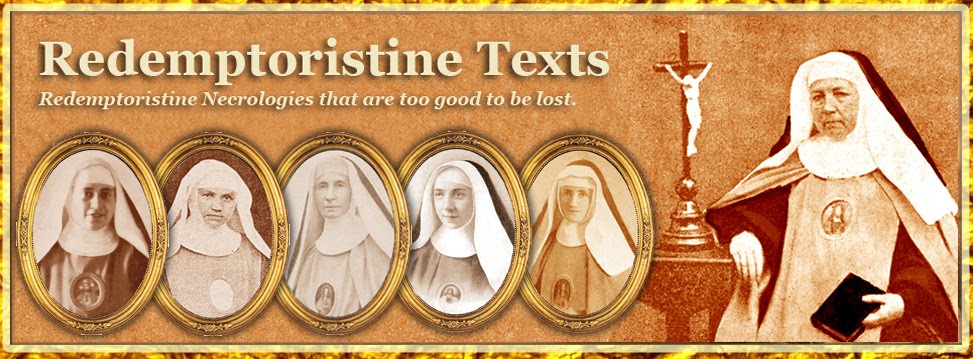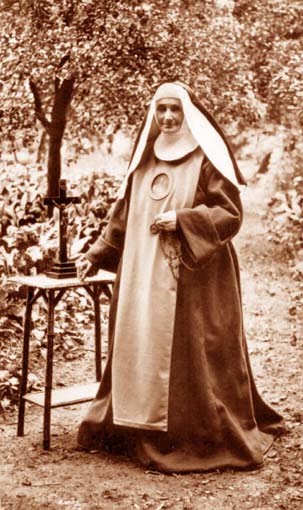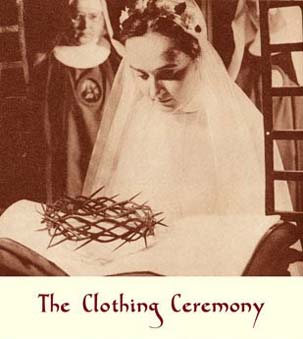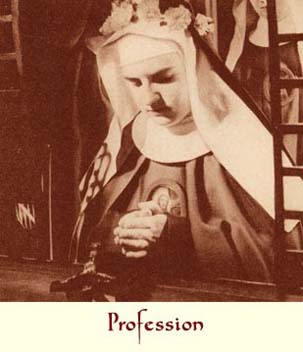The Funeral Eulogy of Our Good and Holy Mother Mary-Aloyse.
By the Most Reverend Father Kockerols,
Provincial of the Province of Belgium.
By the Most Reverend Father Kockerols,
Provincial of the Province of Belgium.
My dear Sisters,
This week you are attending a very great and moving spectacle! Death has made its appearance in your Monastery and has taken from you your venerated Superior. The appearance of death is always a silent sermon. It reminds us that we are only dust and ashes, that everything passes away in this world, and that nothing is great except holiness. It teaches us the nothingness of everything, so it is a great teaching for us. The author of the Imitation says, “If you have ever seen someone die, remember that you will pass along the same way.”
But, my dear Sisters, the death of a holy soul, such as your venerated Mother was, contains a very special teaching for us. Divine Providence has willed that she was for you in some way a preparation for a retreat. I think that, after having assisted your Mother for so long with all the devotion of which I am capable, I cannot let these circumstances pass without telling you something about this dear soul.
Yes, my dear Sisters, you are indeed convinced that you have lost a treasure, a veritable treasure beyond all treasures. God, who gave this privileged soul the mission of governing you and working day and night for your sanctification, had prepared her for this mission. He had ornamented her spirit and her heart with all the gifts of nature and of grace. Everything was great in your Mother: her heart and her spirit, her charity and her intelligence. In her there was nothing small or petty. She was a superior woman, and with what a great heart and character! We can quite justly compare her to Saint Thérèse. Endowed with an upright and enlightened spirit, with a superior intelligence and a sure judgement, she had a heart which could truly say with the Apostle, St. Paul, “I will very willingly give everything I have and I will even give my own self for your souls.” A heart in which were allied the power of a man and the tenderness of a woman, as in the Mother of the Maccabees. No, I am not afraid to compare her to this mother who is more admirable than words can say. She can be compared to the strong woman of the Bible, of whom it is said, “Where shall we go to find her? We must go to the extremities of the earth.” Your good Mother, my dear Sisters, possessed the firmness without which the responsibility of Superior is harmful to her who exercises it and to those on whom it is exercised. Her guiding principle, in all her actions, was to act firmly and sweetly, - Fortiter et suaviter, - God having given her everything which could inspire respect, esteem and affection. To these gifts of nature, God added all the gifts of grace. My dear Sisters, I who have received the secrets of her heart, I am the only one, perhaps, who can tell you with how great a profusion and magnificence of them God had ornamented her beautiful soul. Yes, since her earliest childhood, God pursued her so as to make her a veritable saint. He watched over her, surrounded her with very special graces, and gave her a very admirable purity of heart, an instinctive horror of sin, a fear of even the shadow of evil, and a tender love towards her God, towards Our Lord Jesus Christ, towards the Holy Church! She herself, as humble as she was, avowed to me on her death-bed, that God had heaped His graces upon her during her whole life, and this is why she said she feared nothing at this supreme moment. Rather, she paid tribute to Him in her gratitude for so many graces received, suffering with joy for love of Him. Ah, my dear Sisters, in eternity you will see the progress that your venerated Mother made constantly in virtue, the point of perfection she attained and the numerous sanctifying and hidden graces she received.
As Superior, she was a veritable model. Her virtue shone forth above all in charity and devotion to the community. There is no-one among you who cannot testify that night and day she sacrificed herself or thought of you, forgetting her own self. And above all, what charity and affection she had for the sick!... What a concern to take care of them! She could truly say with the Apostle Paul, “Who is there among you who has suffered as I myself have suffered?” Her charity went as far as excess, as far as prodigality.
What rendered her so great in the eyes of God and in the eyes of man was her forgetfulness of self, for even in the midst of her most cruel sufferings, she was still always concerned for others. My dear Sisters, it is this forgetfulness of self which is the distinctive character of sanctity. Charity is only genuine when it is accompanied with this sublime forgetfulness of self. Who can say that she did not arrive at the supreme degree of character typical of a true religious, to this spirit of sacrifice, abnegation and devotion to one’s neighbour? But this forgetfulness of self naturally produced humility. I myself can testify to the horror she had of all pridefulness, and her humility was the distinctive sign of her love for God. And didn’t God want her to be exempt from all feelings of pride, because of this perfect abnegation which she possessed!
And patience! How much did she shine out with this in her last illness? My dear Sisters, do not think that this virtue grew all by itself in her, or all at once. You have to practise a very great patience when you are well so that you are not impatient when you are ill. But, in regard to her patience, we have never seen her like. Look at the two months when she was nailed to her bed of suffering, and what suffering! I know something about it, since God ordered me to become aware of it. She told me, “I am enduring unheard-of suffering, incredible suffering (that was her expression), impossible to bear without the special assistance of God.” And yet we all saw how that poor soul remained calm and serene. It was simply because, for all her religious life, she secretly practised patience and mortification, in submission to the will of God.
Not only this, but during her life she had personal troubles, as under that rather rough bark was hidden a great heart which felt things keenly. She keenly felt the cross of her responsibilities and the pains which one or the other of you laid on her at times. She suffered from your faults. The least relaxation or lack of fervour had a great repercussion on her soul. She feared it in almost an excessive manner, and all her efforts were designed to maintain fervour. You know very well that this maternal concern extended to other houses of the Order and she suffered greatly when she learned of anything which was to the least detriment, either to fervour, or to the Rule. And so she exercised a great influence over the other Monasteries.
This concern also extended to the whole Congregation. Some hours before her death, she also told me that she had never made any distinction between the Congregation and you, and she offered herself to God to endure His cruel sufferings for all eternity, if such was His good pleasure, for you and the Congregation. Already in the arms of death, she then exclaimed, Fiat, fiat, fiat voluntas Dei! (Let the will of God be done, be done, be done!), and never ceased to say that she was ready to give everything and even give her own self for souls. She loved the souls of poor sinners and all the souls ransomed at the price of the Blood of Jesus Christ.
And so, my dear Sisters, here are the examples given to you by your good Mother! You should all imitate her. And first of all she who will be elected to replace her and all those who have responsibility in the Community. Above all they should practice this forgetfulness of self, of which she has given such beautiful examples. This will be to their own personal profit. Sanctity does not consist of retiring into a corner and being occupied simply with yourself. It consists in sacrificing yourself for the salvation of others, just as your good Mother has taught you.
Do not desire any other place than what you have been assigned. Do not forget your Mother’s last words, her last farewells. Think of God, be all for God, occupy yourselves with nothing else but God, souls, and above all, abandoned souls, deprived of all spiritual succour in the world. If you have some responsibility in the Community, do not grumble if it displeases you, but accept it for the glory of God and for the salvation of souls. Your venerated Mother is a true model for Superiors and myself alike. I am trying to profit from it. As I have said to my colleagues, the wonderful examples I witnessed in the course of my visits to this holy invalid have done me more good than a retreat. May they not be lost on my poor soul! These examples should also be repeated in all your religious lives. But first of all, we should be intimately convinced that we can do nothing without humility, us Redemptorists and Redemptoristines above all. We must take as the basis of our own perfection that beautiful virtue of humility and simplicity. Your good Mother was so penetrated by it that she said at the end of her life, “After my death, I hope that no-one will try to pass me off as a saint, but will preach instead all my defects and faults, so that prayers will be said for my poor soul.” What an example of humility! Also remember how much she loved the Rule and practised it in every way as Saint Alphonsus would have wished. And how anxious she was to see it done also in all the other houses of the Order! She had an almost child-like obedience. And here now is a little secret which I think I can now reveal to you. She had made a vow to obey her director in everything, and in her last hour, I was able to assure her that she had never failed in any way at all to fulfil this vow which she had made for the love of God.
And how much she loved poverty. She deprived herself of everything, making simplicity reign in the house, and she unceasingly recommended it in practice.
What shall I say about her spirit of mortification? How many times have I not had to stop her! When she was already in the arms of death, she still wanted to do some small mortifications and suffer some privations. So on this point, be good imitators of your Mother, my dear Sisters. She had a supreme horror of exceptions, and she was very austere with herself, while at the same time being indulgent towards others. So let us imitate her as much as we can, so if we had to die some years ahead of time, our good God would be most happy to send some other vocations to reward our love.
And imitate your holy Mother’s recollection too. Even the most distracting occupations did not tear her away from her God. She knew that genuine piety consists of pleasing God in everything, and so her soul was in a continual union with Him. From where did she draw her virtue, her patience and her submission to the divine will? In her love for Jesus Christ she was truly able to say with Saint Paul, “My life is Jesus Christ, and death to me is a gain.” She loved the Blessed Sacrament so much! How much she longed every day, especially during her last illness, to receive it during Holy Communion! And she drew these fine virtues from meditating on the Passion of Our Lord and Mary’s sorrows. So sometimes it seems that Jesus lifted a corner of the veil for her with which He hides His divinity. She avowed to me, at the end of her life, that the graces she had received were so powerful and so strong that she was devoured by the desire to see God face to face. And it is certain that without these extraordinary graces, she would never have been able to speak of God and eternity the way that she did. For me it was a consolation to hear her words.
Yes, my dear Sisters, you have lost a real treasure! Alas, my dear Sisters, you will never see her again in choir, where she sang and recited the praises of the Lord so often and with such fervour. You will never see her again in the long corridors where she edified you by her recollected air. You will never see your dear Mother again in the refectory, which has witnessed so many mortifications. You will never see her again in that room where she so often consoled and encouraged you. You will never see her again in the recreation room where she was so good at uniting to the gravity required by her responsibilities the joy and the saintly happiness of the children of Saint Alphonsus. You will never see her again, your dear Mother, here in the corner of the Conference room where she listened with so much attention, eagerness and love to the words of God. Today you have brought her on your shoulders to the door of the enclosure, and I have had the consolation of accompanying her to her last resting-place. No, you will never see her here again, but with your eyes of faith, you will see her in heaven among all the Redemptoristine saints who have proceeded her, and among them I am certain she will shine like a bright star for all eternity. Go to her now just as you used to go to see her in her cell, tell her all your needs, and she will obtain all the spiritual graces for you that you require. She has suffered so much for you, and she promised not to forget you! Oh, my dear Sisters, do not forget your Mother’s teachings, nor the fine examples she has left you. She can say to you like the Apostle, “Imitate me as I have imitated Christ.” So let us all say, “I wish to remember unceasingly the good examples which our venerated Mother has left us, and try to imitate them. Oh, if only our own death will be the same as hers!” And so it will be, my dear Sisters, if we are good at doing what she has done, and if we are good imitators of Our Lord, for then we will see Him face to face with her in that beautiful Paradise where we shall sing of His mercies in all eternity.
This week you are attending a very great and moving spectacle! Death has made its appearance in your Monastery and has taken from you your venerated Superior. The appearance of death is always a silent sermon. It reminds us that we are only dust and ashes, that everything passes away in this world, and that nothing is great except holiness. It teaches us the nothingness of everything, so it is a great teaching for us. The author of the Imitation says, “If you have ever seen someone die, remember that you will pass along the same way.”
But, my dear Sisters, the death of a holy soul, such as your venerated Mother was, contains a very special teaching for us. Divine Providence has willed that she was for you in some way a preparation for a retreat. I think that, after having assisted your Mother for so long with all the devotion of which I am capable, I cannot let these circumstances pass without telling you something about this dear soul.
Yes, my dear Sisters, you are indeed convinced that you have lost a treasure, a veritable treasure beyond all treasures. God, who gave this privileged soul the mission of governing you and working day and night for your sanctification, had prepared her for this mission. He had ornamented her spirit and her heart with all the gifts of nature and of grace. Everything was great in your Mother: her heart and her spirit, her charity and her intelligence. In her there was nothing small or petty. She was a superior woman, and with what a great heart and character! We can quite justly compare her to Saint Thérèse. Endowed with an upright and enlightened spirit, with a superior intelligence and a sure judgement, she had a heart which could truly say with the Apostle, St. Paul, “I will very willingly give everything I have and I will even give my own self for your souls.” A heart in which were allied the power of a man and the tenderness of a woman, as in the Mother of the Maccabees. No, I am not afraid to compare her to this mother who is more admirable than words can say. She can be compared to the strong woman of the Bible, of whom it is said, “Where shall we go to find her? We must go to the extremities of the earth.” Your good Mother, my dear Sisters, possessed the firmness without which the responsibility of Superior is harmful to her who exercises it and to those on whom it is exercised. Her guiding principle, in all her actions, was to act firmly and sweetly, - Fortiter et suaviter, - God having given her everything which could inspire respect, esteem and affection. To these gifts of nature, God added all the gifts of grace. My dear Sisters, I who have received the secrets of her heart, I am the only one, perhaps, who can tell you with how great a profusion and magnificence of them God had ornamented her beautiful soul. Yes, since her earliest childhood, God pursued her so as to make her a veritable saint. He watched over her, surrounded her with very special graces, and gave her a very admirable purity of heart, an instinctive horror of sin, a fear of even the shadow of evil, and a tender love towards her God, towards Our Lord Jesus Christ, towards the Holy Church! She herself, as humble as she was, avowed to me on her death-bed, that God had heaped His graces upon her during her whole life, and this is why she said she feared nothing at this supreme moment. Rather, she paid tribute to Him in her gratitude for so many graces received, suffering with joy for love of Him. Ah, my dear Sisters, in eternity you will see the progress that your venerated Mother made constantly in virtue, the point of perfection she attained and the numerous sanctifying and hidden graces she received.
As Superior, she was a veritable model. Her virtue shone forth above all in charity and devotion to the community. There is no-one among you who cannot testify that night and day she sacrificed herself or thought of you, forgetting her own self. And above all, what charity and affection she had for the sick!... What a concern to take care of them! She could truly say with the Apostle Paul, “Who is there among you who has suffered as I myself have suffered?” Her charity went as far as excess, as far as prodigality.
What rendered her so great in the eyes of God and in the eyes of man was her forgetfulness of self, for even in the midst of her most cruel sufferings, she was still always concerned for others. My dear Sisters, it is this forgetfulness of self which is the distinctive character of sanctity. Charity is only genuine when it is accompanied with this sublime forgetfulness of self. Who can say that she did not arrive at the supreme degree of character typical of a true religious, to this spirit of sacrifice, abnegation and devotion to one’s neighbour? But this forgetfulness of self naturally produced humility. I myself can testify to the horror she had of all pridefulness, and her humility was the distinctive sign of her love for God. And didn’t God want her to be exempt from all feelings of pride, because of this perfect abnegation which she possessed!
And patience! How much did she shine out with this in her last illness? My dear Sisters, do not think that this virtue grew all by itself in her, or all at once. You have to practise a very great patience when you are well so that you are not impatient when you are ill. But, in regard to her patience, we have never seen her like. Look at the two months when she was nailed to her bed of suffering, and what suffering! I know something about it, since God ordered me to become aware of it. She told me, “I am enduring unheard-of suffering, incredible suffering (that was her expression), impossible to bear without the special assistance of God.” And yet we all saw how that poor soul remained calm and serene. It was simply because, for all her religious life, she secretly practised patience and mortification, in submission to the will of God.
Not only this, but during her life she had personal troubles, as under that rather rough bark was hidden a great heart which felt things keenly. She keenly felt the cross of her responsibilities and the pains which one or the other of you laid on her at times. She suffered from your faults. The least relaxation or lack of fervour had a great repercussion on her soul. She feared it in almost an excessive manner, and all her efforts were designed to maintain fervour. You know very well that this maternal concern extended to other houses of the Order and she suffered greatly when she learned of anything which was to the least detriment, either to fervour, or to the Rule. And so she exercised a great influence over the other Monasteries.
This concern also extended to the whole Congregation. Some hours before her death, she also told me that she had never made any distinction between the Congregation and you, and she offered herself to God to endure His cruel sufferings for all eternity, if such was His good pleasure, for you and the Congregation. Already in the arms of death, she then exclaimed, Fiat, fiat, fiat voluntas Dei! (Let the will of God be done, be done, be done!), and never ceased to say that she was ready to give everything and even give her own self for souls. She loved the souls of poor sinners and all the souls ransomed at the price of the Blood of Jesus Christ.
And so, my dear Sisters, here are the examples given to you by your good Mother! You should all imitate her. And first of all she who will be elected to replace her and all those who have responsibility in the Community. Above all they should practice this forgetfulness of self, of which she has given such beautiful examples. This will be to their own personal profit. Sanctity does not consist of retiring into a corner and being occupied simply with yourself. It consists in sacrificing yourself for the salvation of others, just as your good Mother has taught you.
Do not desire any other place than what you have been assigned. Do not forget your Mother’s last words, her last farewells. Think of God, be all for God, occupy yourselves with nothing else but God, souls, and above all, abandoned souls, deprived of all spiritual succour in the world. If you have some responsibility in the Community, do not grumble if it displeases you, but accept it for the glory of God and for the salvation of souls. Your venerated Mother is a true model for Superiors and myself alike. I am trying to profit from it. As I have said to my colleagues, the wonderful examples I witnessed in the course of my visits to this holy invalid have done me more good than a retreat. May they not be lost on my poor soul! These examples should also be repeated in all your religious lives. But first of all, we should be intimately convinced that we can do nothing without humility, us Redemptorists and Redemptoristines above all. We must take as the basis of our own perfection that beautiful virtue of humility and simplicity. Your good Mother was so penetrated by it that she said at the end of her life, “After my death, I hope that no-one will try to pass me off as a saint, but will preach instead all my defects and faults, so that prayers will be said for my poor soul.” What an example of humility! Also remember how much she loved the Rule and practised it in every way as Saint Alphonsus would have wished. And how anxious she was to see it done also in all the other houses of the Order! She had an almost child-like obedience. And here now is a little secret which I think I can now reveal to you. She had made a vow to obey her director in everything, and in her last hour, I was able to assure her that she had never failed in any way at all to fulfil this vow which she had made for the love of God.
And how much she loved poverty. She deprived herself of everything, making simplicity reign in the house, and she unceasingly recommended it in practice.
What shall I say about her spirit of mortification? How many times have I not had to stop her! When she was already in the arms of death, she still wanted to do some small mortifications and suffer some privations. So on this point, be good imitators of your Mother, my dear Sisters. She had a supreme horror of exceptions, and she was very austere with herself, while at the same time being indulgent towards others. So let us imitate her as much as we can, so if we had to die some years ahead of time, our good God would be most happy to send some other vocations to reward our love.
And imitate your holy Mother’s recollection too. Even the most distracting occupations did not tear her away from her God. She knew that genuine piety consists of pleasing God in everything, and so her soul was in a continual union with Him. From where did she draw her virtue, her patience and her submission to the divine will? In her love for Jesus Christ she was truly able to say with Saint Paul, “My life is Jesus Christ, and death to me is a gain.” She loved the Blessed Sacrament so much! How much she longed every day, especially during her last illness, to receive it during Holy Communion! And she drew these fine virtues from meditating on the Passion of Our Lord and Mary’s sorrows. So sometimes it seems that Jesus lifted a corner of the veil for her with which He hides His divinity. She avowed to me, at the end of her life, that the graces she had received were so powerful and so strong that she was devoured by the desire to see God face to face. And it is certain that without these extraordinary graces, she would never have been able to speak of God and eternity the way that she did. For me it was a consolation to hear her words.
Yes, my dear Sisters, you have lost a real treasure! Alas, my dear Sisters, you will never see her again in choir, where she sang and recited the praises of the Lord so often and with such fervour. You will never see her again in the long corridors where she edified you by her recollected air. You will never see your dear Mother again in the refectory, which has witnessed so many mortifications. You will never see her again in that room where she so often consoled and encouraged you. You will never see her again in the recreation room where she was so good at uniting to the gravity required by her responsibilities the joy and the saintly happiness of the children of Saint Alphonsus. You will never see her again, your dear Mother, here in the corner of the Conference room where she listened with so much attention, eagerness and love to the words of God. Today you have brought her on your shoulders to the door of the enclosure, and I have had the consolation of accompanying her to her last resting-place. No, you will never see her here again, but with your eyes of faith, you will see her in heaven among all the Redemptoristine saints who have proceeded her, and among them I am certain she will shine like a bright star for all eternity. Go to her now just as you used to go to see her in her cell, tell her all your needs, and she will obtain all the spiritual graces for you that you require. She has suffered so much for you, and she promised not to forget you! Oh, my dear Sisters, do not forget your Mother’s teachings, nor the fine examples she has left you. She can say to you like the Apostle, “Imitate me as I have imitated Christ.” So let us all say, “I wish to remember unceasingly the good examples which our venerated Mother has left us, and try to imitate them. Oh, if only our own death will be the same as hers!” And so it will be, my dear Sisters, if we are good at doing what she has done, and if we are good imitators of Our Lord, for then we will see Him face to face with her in that beautiful Paradise where we shall sing of His mercies in all eternity.
Misericordias Domini in aeternum cantabo.
I shall sing of the mercies of the Lord in eternity.
This necrology is translated from Fleurs de l'Institut des Rédemptoristines by Mr John R. Bradbury. The copyright of this translation is the property of the Redemptoristine Nuns of Maitland, Australia. The integral version of the translated book will be posted here as the necrologies appear.

I shall sing of the mercies of the Lord in eternity.
This necrology is translated from Fleurs de l'Institut des Rédemptoristines by Mr John R. Bradbury. The copyright of this translation is the property of the Redemptoristine Nuns of Maitland, Australia. The integral version of the translated book will be posted here as the necrologies appear.





























